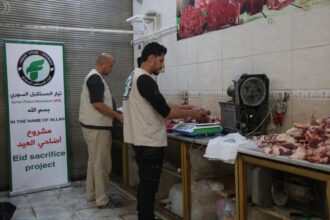Captagon: Assad’s Oxygen

Since 2011 and until 2023, numerous economic sanctions have been imposed on the Syrian regime. Some of these sanctions include:
- European Union sanctions: The EU began imposing sanctions on the Syrian regime in 2011, including a ban on trading goods that could be used to repress civilians. In June 2023, the EU announced the extension of its sanctions on the Syrian regime until June 1, 2023.
- United States sanctions: In August 2011, the U.S. imposed an oil embargo and froze the financial assets of several Syrian regime figures, as well as the financial assets of the Syrian state itself.
- Other sanctions: These include an embargo on oil imports, investment restrictions, freezing of the Syrian Central Bank’s assets in the EU, and export restrictions on equipment and technology that can be used for repression or monitoring of civilians’ phones or internet activities.
Hard Currency:
Hard currency (USD) plays a crucial role in the economies of developing countries, including the Syrian regime, for the following reasons:
- Importing: Developing countries often need to import goods and services from advanced countries, which requires hard currency, significantly impacting the Syrian regime’s purchasing power due to continuous sanctions.
- External debts and investments: Developing countries often borrow from advanced countries or international institutions like the IMF, requiring repayment in hard currency. Additionally, direct foreign investments, a vital source of financing and development, are often made in hard currency. Since the Syrian regime has agreements with Iran and Russia (which will be detailed in another article), it is compelled to pay them in dollars.
- Economic stability: Maintaining sufficient hard currency reserves can help stabilize the economy by using these reserves to intervene in currency markets to maintain the value of the local currency, leading to a significant devaluation of the Syrian currency.
- Foreign trade: Hard currency is also required for settling international trade transactions. Developing countries relying on exports, like raw or industrial goods, earn hard currency through such trade. According to the World Bank’s “Syrian Economy Watch, Winter 2022/2023,” the Syrian economy suffers from significant deterioration due to conflict, rising input costs, and dependency on imports for nearly half of its oil consumption and about a third of its grain consumption, which requires hard currency exchange.
- Economic development: Hard currency assists developing countries in funding investments in infrastructure, education, and health, all critical elements for economic development, which the regime needs for reconstruction.
Hard Currency Sources for the Syrian Regime:
- Oil: Syria’s oil production of around 450,000 barrels per day exceeded domestic market needs, exporting the surplus of about 150,000 barrels per day, primarily to Germany.
- Cotton, sheep, and cattle: Syria was among the world’s top five countries in cotton production and sheep and cattle breeding.
- Grains: Syria’s grain production ranged between 3.5 to 6 million tons annually, usually exceeding domestic market needs.
- Tourism: Syria, known for its affordable products, quality consumer industries, and rich history, attracted millions of tourists annually, exceeding 8 million in 2010.
Due to the aforementioned sanctions, authoritarian rule, war, diverse areas of influence in Syria, and the Syrian regime’s losses against its enemies (the opposition and SDF) and allies who gained significant concessions including resources and ports, official and legal sources of hard currency and investment for the Syrian economy were closed. The regime turned to the manufacturing and smuggling of Captagon as the sole solution to bolster its economy. Captagon later became a significant income source in the Syrian economy, with its trade value exceeding 5 billion dollars in 2021. A report by the American institute “New Lines” confirmed that the Syrian regime uses this trade as a means to politically and economically survive the imposed sanctions, classifying it as the foremost producer and exporter of these pills. This led U.S. President Joe Biden to sign, at the end of 2022, following Congressional approval, a bill to combat the production of Captagon manufactured by the Syrian regime. In a statement in March 2023, the British Minister of State for the Middle East, Tariq Ahmad, clarified that the Captagon drug trade is valued at 57 billion dollars, backed by businessmen, militias, and relatives of Syrian President Bashar al-Assad. The British Minister added that the Captagon market has expanded beyond the Middle East to Europe and Asia.
In the same context, the U.S. Treasury Department stated in a release that the United States imposed new sanctions on six individuals, including two relatives of Bashar al-Assad, for their roles in the production or export of Captagon. The department mentioned that Captagon trade generates profits estimated in the billions of dollars. The new sanctions aim to highlight the role of smugglers and the Assad family’s dominance over the trade of this dangerous stimulant, which contributes to financing the Syrian government.
According to a report published by The Economist, with the collapse of the official economy under the impact of war, sanctions, and oppressive rule, drug exports have become Assad’s Syria’s main source of hard currency. The report indicated that the COAR (Center for Operational Analysis and Research), a consultancy based in Cyprus, reported that authorities elsewhere have seized Syrian drugs worth no less than $3.4 billion, compared to Syria’s largest legal export, olive oil, valued at about $122 million annually.
Therefore, the Syrian regime will not surrender to all campaigns against its sale of Captagon and will continue to rely on it even if sanctions are lifted. By doing so, it aims to use Captagon as a new weapon against the international community to impose its terms in the political solution.
This solution will not happen without implementing international resolutions and convincing the Syrian opposition of this.
Thus, we in the Syrian Future Movement recommend preparing for an international mobilization to end the Captagon file through imposing a political solution in Syria, transitioning it towards becoming a modern state with a free economy that eliminates the need for manufacturing and exporting drugs.
In case of the current international community’s failure, we recommend the necessity of an international military intervention (as a precise and decisive surgical action) within an Arab coalition supporting the southern regions, to make them a safe zone outside the Syrian regime’s control in the first phase. Subsequently, transitioning them to what we had proposed as the ‘West Germany’ experience, which we call ‘Syria’s Jeddah,’ by organizing the areas outside the regime’s control from the north, east, and south into a Syrian national entity with international and Arab support.
Then, imposing a political solution on the Syrian regime and its allies by force.
Ammar Al-Amouri
Researcher in the Research and Studies Department
Economic Office.”






